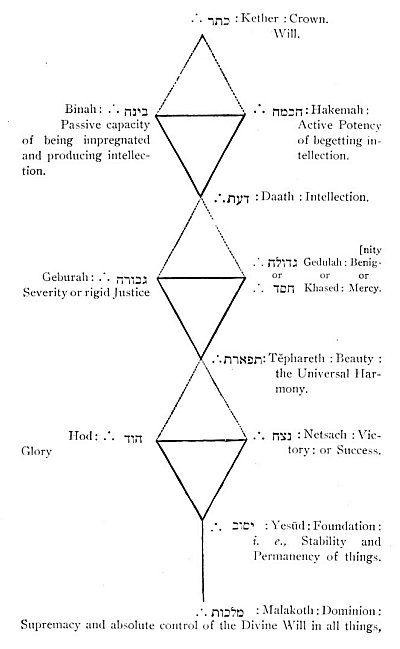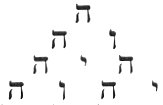“Be it heard!
“This Universe existed only in the first divine idea yet unexpanded, as if involved in darkness, imperceptible, undefinable, undiscoverable by reason, and undiscovered by revelation, as if it were wholly immersed in sleep:
“Then the Sole Self-existing Power, Himself undiscovered, but making this world discernible, with five elements, and other principles of nature, appeared with undiminished glory, expanding His idea, or dispelling the gloom.
“He Whom the mind alone can perceive, whose essence eludes the eternal organs, who has no visible parts, who exists from Eternity, even He, the soul of all beings, Whom no being can comprehend, shone forth.
“He, having willed to produce various beings from His own divine Substance, first with a thought created the waters…. From that which is [precisely the Hebrew ו ?Y?H?W?H], the first cause, not the object of sense, existing everywhere in substance, not existing to our perception, without beginning or end” [the Α∴ and Ω∴, or the Ι∴Α∴Ω∴], “was produced the divine male famed in all worlds under the appellation of Brahma.”
Then recapitulating the different things created by Brahma, he adds: “He,” meaning Brahma [the Λογος, the WORD], “whose powers are incomprehensible, having thus created this Universe, was again absorbed in the Supreme Spirit, changing the time of energy for the time of repose.”
The Antareya A’ran’ya, one of the Vedas, gives this primitive
p. 609
idea of the creation: “In the beginning, the Universe was but a Soul: nothing else, active or inactive, existed. Then HE had this thought, I will create worlds; and thus HE created these different worlds; air, the light, mortal beings, and the waters.
“HE had this thought: Behold the worlds; I will create guardians for the worlds. So HE took of the water and fashioned a being clothed with the human form. He looked upon him, and of that being so contemplated, the mouth opened like an egg, and speech came forth, and from the speech fire. The nostrils opened, and through them went the breath of respiration, and by it the air was propagated. The eyes opened; from them came a luminous ray, and from it was produced the sun. The ears dilated; from them came hearing, and from hearing space:” . . . and, after the body of man, with the senses, was formed;–“HE, the Universal Soul, thus reflected: How can this body exist without Me? He examined through what extremity He could penetrate it. He said to Himself: If, without Me, the World is articulated, breath exhales, and sight sees; if hearing hears, the skin feels, and the: mind reflects, deglutition swallows, and the generative organ fulfils its functions, what then am I? And separating the suture of the cranium, He penetrated into man.”
Behold the great fundamental primitive truths! God, an infinite Eternal Soul or Spirit. Matter, not eternal nor self-existent, but created–created by a thought of God. After matter, and worlds, then man, by a like thought: and finally, after endowing him with the senses and a thinking mind, a portion, a spark, of God Himself penetrates the man, and becomes a living spirit within him.
The Vedas thus detail the creation of the world:
“In the beginning there was a single God, existing of Himself; Who, after having passed an eternity absorbed in the contemplation of His own being, desired to manifest His perfections outwardly of Himself; and created the matter of the world. The four elements being thus produced, but still mingled in confusion, He breathed upon the waters, which swelled up into an immense ball in the shape of an. egg, and, developing themselves, became the vault and orb of Heaven which encircles the earth. Having made the earth and the bodies of animal beings, this God, the essence of movement, gave to them, to animate them, a portion of His own being. Thus, the soul of everything that breathes
p. 610
being a fraction of the universal soul, none perishes; but each soul merely changes its mould and form, by passing successively into different bodies. Of all forms, that which most pleases the Divine Being is Man, as nearest approaching His own perfections. When a man, absolutely disengaging himself from his senses, absorbs himself in self-contemplation, he comes to discern the Divinity, and becomes part of Him.”

Moe is the founder of GnosticWarrior.com. He is a father, husband, author, martial arts black belt, and an expert in Gnosticism, the occult, and esotericism.






